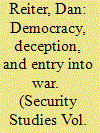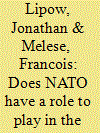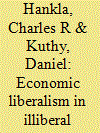|
|
|
Sort Order |
|
|
|
Items / Page
|
|
|
|
|
|
|
| Srl | Item |
| 1 |
ID:
116240


|
|
|
|
|
| Publication |
2012.
|
| Summary/Abstract |
Realists propose that elected leaders that seek war but face a hesitant public may use deception to build public support for war. Leaders may secretly make provocative diplomatic or military moves to push the adversary to attack first, rallying the public behind a war effort seen as defensive, or publicly exaggerate the threat posed by the adversary. This paper develops a liberal institutionalist critique of this theory, positing that elected leaders are deterred from engaging in such deception because democratic political institutions such as political competition, a professionalized military, and the marketplace of ideas increase the likelihood that such moves will be exposed, and once exposed, deceptive politicians will suffer domestic political punishment. The paper examines the thesis that Franklin Roosevelt sought to provoke Germany and Japan to war in 1941, finding little support. It also finds that in general autocratic leaders are more likely than elected leaders to deceive.
|
|
|
|
|
|
|
|
|
|
|
|
|
|
|
|
| 2 |
ID:
093077


|
|
|
|
|
| Publication |
2009.
|
| Summary/Abstract |
The financial crisis endangers the security of NATO's members and partners. As such, NATO has a formal obligation to mobilize its resources to aid members in overcoming current economic challenges. NATO can play a valuable role on three levels. First, NATO can aid members in rationalizing their military procurement and manpower systems, thus reducing the fiscal burden of maintaining adequate defenses. Second, NATO can press the ECB and the EU to modify arrangements governing the Euro so as to minimize the risk that EMU will collapse. Finally, NATO has a "soft power" role in vigorously defending the liberal economic order and democratic political institutions of the Western Alliance from the ideological attacks that inevitably follow financial crises.
|
|
|
|
|
|
|
|
|
|
|
|
|
|
|
|
| 3 |
ID:
123620


|
|
|
|
|
| Publication |
2013.
|
| Summary/Abstract |
Over the last few decades, a vast literature has emerged examining the relationship between democratic political institutions and trade policy outcomes. While this literature has added significantly to our knowledge, it has effectively ignored policymaking in dozens of important states-those that remain autocratic. This paper fills that hole by exploring the effects of authoritarian variation on national trade policies. Our contention is that more institutionalized authoritarian regimes will tend to adopt more open trade policies. This relationship should hold, we argue, for two distinct reasons. First, we argue that autocratic regimes with larger "selectorates" should have greater incentives to provide public rather than private goods. As a result, we expect that multiparty, and to a lesser extent single-party, autocracies will tend to prefer more open trade policies than non-party (often personalistic) dictatorships, monarchies, and military juntas. Second, we contend that more stable autocratic regimes will have longer time horizons and therefore greater incentives to adopt policies, such as trade openness, that may strengthen long-run economic performance. We find strong support for these arguments using several cross-national time-series models of all autocracies ranging from 1962 to 2007 (contingent on data availability).
|
|
|
|
|
|
|
|
|
|
|
|
|
|
|
|
| 4 |
ID:
152328


|
|
|
|
|
| Summary/Abstract |
Using a new measure of immigration policy and examining thirty-six advanced industrial countries between 1996 and 2012, we seek to explain systematically the variation in external labor openness among the more advanced democracies as primary destination countries, using a model where the government feels political pressure through both a voter/electoral channel and a special-interests channel. With voters primarily pressing for immigration restrictions and special interest pressure aimed at immigration openness, democratic political institutions—like a parliamentary system and proportional representation voting with greater district magnitude that make governments more responsive to voters and less responsive to special interests—should be associated with less change toward a more open official immigration policy. Our statistical evidence accords with this expectation.
|
|
|
|
|
|
|
|
|
|
|
|
|
|
|
|
|
|
|
|
|